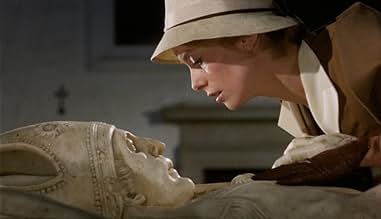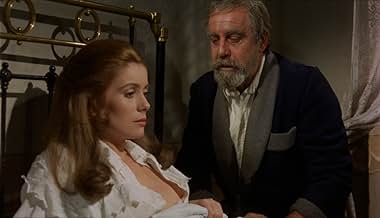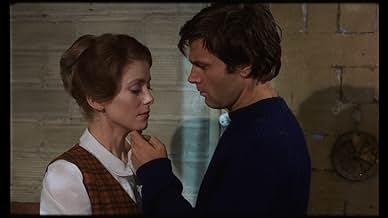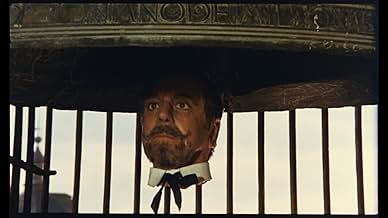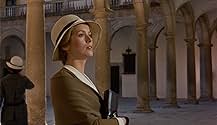Peu de temps après la mort de sa mère, une femme jeune et innocente trouve refuge dans la maison de son tuteur, un aristocrate d'âge moyen. Mais celui-ci lui fait des avances sexuelles.Peu de temps après la mort de sa mère, une femme jeune et innocente trouve refuge dans la maison de son tuteur, un aristocrate d'âge moyen. Mais celui-ci lui fait des avances sexuelles.Peu de temps après la mort de sa mère, une femme jeune et innocente trouve refuge dans la maison de son tuteur, un aristocrate d'âge moyen. Mais celui-ci lui fait des avances sexuelles.
- Director
- Writers
- Stars
- Nommé pour 1 oscar
- 11 victoires et 4 nominations au total
- Muchacha
- (as María Paz Pondal)
- Don Cándido
- (as Juan José Menéndez)
Avis en vedette
Tristana, played brilliantly by Catherine Denueve, is the central character whom we see evolve from an innocent young girl with her many ideals about love and relationship, to a bitter and cynical woman at the film's end who cannot believe in anything any longer. It is with special finesse that Deneuve plays her, that we witness, with heartbreak, every turn of her back on the things she love, and every rejection of all morality that she held before.
Fernando Rey's character is probably the murkiest but ultimately most empathetic character, as at the end of the film, age wears off his hard-edged cynicism and turns him into the loving father figure that Tristana desperately needed in the beginning of the film. In a sense, it is a film about age, how when we reach a certain point in our lives we see things much clearer and as it is, rather than try to twist things to our advantage. The way Rey's character treasures the time with the vile and vindictive Tristana at the end of the film is not only overwhelmingly sad, but also an epiphany by an auteur who is gaining age himself.
In spite of all its dramatic turns of events, Tristana is not an emotional and angsty film in its portrayal of its characters' lives. Instead it is a soft and peaceful film that sympathetically accepts its characters' flaws as much as it forgives them. It is a film that evokes the intricate feeling of looking back in our dark and troubled past and finding the exquisite moments of happiness amidst all the cynicism and grit. When, towards the end, Rey reaches the peace that he has been struggling so hard to attain throughout the film, he notes, 'It's snowing so hard outside, but in this house, I'm nice and warm. What's there not to be happy about?'. A silent recognition that peace is not bending reality to your own will, but merely, acceptance.
This is the sensuous story of Tristana , a drama with surrealism and sour portrait upon social classes , catholicism , sexual abuses and many other things , being stunningly realized by the Spanish maestro of surrealism , the great Luis Buñuel . This is a typical Buñuel film , as there are a lot of symbolism , social critique , including mockery or wholesale review upon religion , especially Catholicism . Luis Buñuel was given a strict Jesuit education which sowed the seeds of his obsession with both subversive behavior and religion , issues well shown in a lot of films and that would preoccupy Buñuel for the rest of his career . Here Bunuel gives a perverse studio about religion , old age , desire along with deformity ; and was strongly cut by Spanish censorship . The film describes unequal status of women , heir to a long tradition of marginalization, subjugation, exploitation and lack of rights , subsequently suffragists and protest movements emerge in pro-women . Interesting and thought-provoking screenplay from the same Luis Buñuel and Julio Alejandro , Buñuel's usual screenwriter , based on the novel by Benito Pérez Galdós ; they pull off a straight-faced treatment of shocking subject matter . Bunuel's adaptation retains the spirit of protest written by Galdos, and moved to a later time in 40 years to the novel . Nice acting by Fernando Rey as an old man who falls for the innocent girl in his charge , to the point of result to be perhaps the best performance of his long career . Rey played various Buñuel films such as The Discreet Charm of the Bourgeoisie , That Obscure object of Desire and Viridiana . And Catherine Deneuve's finest most enigmatic acting as a young cynical woman who goes to live with her guardian and subsequently turned into a bitter incapacitated cripple . The film relies heavily on the relationship between them , as is developed a rare lover/father relationship with her . One of Bunuel's most serious and serene ¨Tristana¨ is packed with surreal moments , criticism , absurd situations , masochism and nightmares . Furthermore , Buñuel satirizes and he carries out outright critical to aristocracy , bourgeoisie and attack upon religion . Pretty good support cast gives fine acting ; it is mostly formed by nice Spanish actors such as Antonio Casas , Fernando Cebrian, Jose Maria Caffarel , Antonio Ferrandis , Jose Calvo , Sergio Mendizabal , Juanjo Menendez ,among others . Beautifully shot in Toledo with a splendid cinematography by Jose Aguayo . Tristana was voted tenth best Spanish film by professionals and critics in 1996 Spanish cinema centenary and nominated for an Oscar ,film Foreign Language.
Thid wry and dramatic motion picture was compellingly directed by Luis Buñuel who was voted the 14th Greatest Director of all time . This Buñuel's strange film belongs to his French second period ; in fact , it's plenty of known Spanish actors . Born in Calanda , Aragon (1900) , Buñuel subsequently moved to Madrid to study at the university there, where his close friends included Salvador Dalí and Federico García Lorca. After moving to Paris , at the beginning Buñuel did a variety of film-related odd jobs , including working as an assistant to director Jean Epstein . With financial help from his mother and creative assistance from Dalí, he made his first film , this 17-minute "Un Chien Andalou" (1929), and immediately catapulted himself into film history thanks to its disturbing images and surrealist plot . The following year , sponsored by wealthy art patrons, he made his first picture , the scabrous witty and violent "Age of Gold" (1930), which mercilessly attacked the church and the middle classes, themes that would preoccupy Buñuel for the rest of his career . That career, though, seemed almost over by the mid-1930s, as he found work increasingly hard to come by and after the Spanish Civil War , where he made ¨Las Hurdes¨ , as Luis emigrated to the US where he worked for the Museum of Modern Art and as a film dubber for Warner Bros . He subsequently went on his Mexican period he teamed up with producer Óscar Dancigers and after a couple of unmemorable efforts shot back to international attention with the lacerating study of Mexican street urchins in ¨Los Olvidados¨ (1950), winning him the Best Director award at the Cannes Film Festival. But despite this new-found acclaim, Buñuel spent much of the next decade working on a variety of ultra-low-budget films, few of which made much impact outside Spanish-speaking countries , though many of them are well worth seeking out . As he went on filming "The Great Madcap" , ¨The brute¨, "Wuthering Heights", ¨El¨ , "The Criminal Life of Archibaldo De la Cruz" , ¨Robinson Crusoe¨ , ¨Death in the garden¨ and many others . After returning his native country, Spain, by making ¨Viridiana¨ this film was prohibited on the grounds of blasphemy as well as ¨The milky way¨ or Via Lactea , both of them were strongly prohibited by Spanish censorship . This French-Spanish final period in collaboration with producer Serge Silberman and writer Jean-Claude Carrière with notorious as well as polemic films such as ¨Viridiana¨ , ¨The Discreet Charm of the Bourgeoisie" and ¨Belle De Jour¨. His last one was the notorious ¨That obscure object of desire¨ (1977) .
7/10
Buñuel's attention to detail is extraordinary. Every scene is packed with visual interest. In some strange way, the decor forms an essential part of the structure; it is a facet of Buñuel's unique vision. Moreover, he not only knows exactly when to end a sequence, but how to end it. For instance, when Don Lope (Rey) puts down the dog and walks away, the camera follows not him but the dog: an endearing and brilliant touch, and there are many more. Compelling throughout, even spellbinding.
If this film were a framed picture hanging in a gallery, thousands would come to see it and Buñuel would be acclaimed as a great artist. He was a great artist, in fact, but the cinema is an ephemeral form and people forget. We need to buy the videos and watch these fine movies from time to time, just to remind ourselves that a film can be a significant art form and not merely a commercial product cynically synthesised to extract the largest amount of money from the greatest number of people.
Le saviez-vous
- AnecdotesLuis Buñuel said that many of Tristana's idiosyncrasies, including her habit of asking people to choose between nearly identical objects, was based on the director's sister's similar habits.
- Citations
Don Lope: Poor workers. Cheated and then beaten. Work is a curse, Saturno. Down with work that you have to do to survive. That work isn't honorable, as some say. All it does is fatten the exploiting swine. However, what you do for pleasure ennobles man. If only we could all work like that. Look at me, I'd rather be hanged than work! So, I live poorly, but I live without working.
- Autres versionsOriginally released in Europe at 105 minutes.
- Bandes originalesÉtude No 12 in C minor, Op 10 'Revolutionary'
Written by Frédéric Chopin
Meilleurs choix
- How long is Tristana?Propulsé par Alexa
Détails
- Date de sortie
- Pays d’origine
- Site officiel
- Langue
- Aussi connu sous le nom de
- Mảnh Đời Của Tristana
- Lieux de tournage
- Paseo Recaredo, Toledo, Castilla-La Mancha, Espagne(opening and closing scenes with Saturna, Viridiana and the mute boy)
- sociétés de production
- Consultez plus de crédits d'entreprise sur IMDbPro
Box-office
- Brut – États-Unis et Canada
- 14 586 $ US
- Fin de semaine d'ouverture – États-Unis et Canada
- 4 754 $ US
- 14 oct. 2012
- Brut – à l'échelle mondiale
- 14 586 $ US
- Durée1 heure 39 minutes
- Mixage
- Rapport de forme
- 1.66 : 1
Contribuer à cette page



